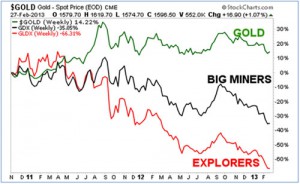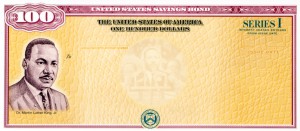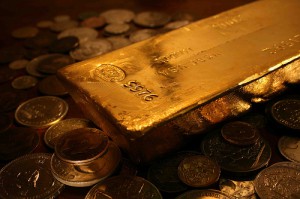For many years now I've been saying that Gold is a Crisis Hedge rather than an inflation hedge. But it is also a commodity and a monetary instrument. Thus there are a variety of factors affecting its price at any given time. Currently as the world economy continues rolling on people are less worried about catastrophe around the corner and they are beginning to believe that the FED is all powerful and can paper over any and all monetary problems with the stroke of a pen. So why worry? This has taken some of the edge off the urgency to buy gold. Plus as the stock market reaches new highs the "opportunity cost" of holding gold increases. So does this mean that gold is headed for the dustbin and … [Read more...]
Could a Raise in Minimum Wage Trigger Inflation?
Here at Inflation Data we believe that all other things being equal the primary cause of inflation is an increase in the money supply, i.e. "too much money chasing too few goods." But raising the minimum wage may cause other distortions that will have an effect on the economy so that one simple stroke of a pen can still have a major impact. ~Tim McMahon, editor The Law of Unintended Consequences When the Government increases the minimum wage that employers need to pay to their employees, does it cause more problems later? The Government speaks of a raise as a good thing for the economy in order to boost sales (through more disposable income for the poor) and help low-income families pay … [Read more...]
Sequestration, Currency Wars, Inflation and Ben Bernanke
By Douglas French Laissez Faire Club Only in government speak can more = less We thought for sure the shrill cries of Sequestration hell, fire and brimstone were going to get Congress to hit the panic button and reach a deal. As such, they didn't. And while sequestration takes effect, we'll leave you with this one thought: even though $85 billion is getting "cut" from the federal budget... the government is still going to spend $15 billion more than they did last year. $85 Billion Cut = $15 Billion More Spending In the meantime, Doug French treats us to a look behind the curtain: Ben Bernanke an inflation hawk? Read on... Benny and the Monetary Jets "My inflation record is the … [Read more...]
Costs of Inflation in Business
The current UK inflation rate is 2.7 percent. So what does this mean? The term inflation refers to a general rise in the price of a goods and services. This means the price of a basket of goods this year are, on average, 2.7 percent more expensive than last year. See Also: What is the Real Definition of Inflation? Costs of Inflation Most countries adopt a inflation targeting policy; for example, the Bank of England targets the inflation rate at 2 percent. Generally, governments prefer inflation so they can repay their debts with money that is worth less. If they had their way they would inflate their debts away at a much higher rate than 2%. So why is high inflation deemed a bad … [Read more...]
U.S. Foreign Exchange and The Chinese Currency Exchange Rate
U.S. Foreign Exchange The number of international corporations and financial professionals that follow the ever-changing ratio of U.S. dollars to Chinese Yuan has increased and expanded beyond its borders. This is an indication of just how critical the trade relationship that binds the world's two largest economies has become. Although the relationship between the United States, Canada and Mexico continues to be even more robust than the Sino-American arrangement, the consumer economy of the United States is heavily dependent upon smooth flows of goods from the workshops of China to the Pacific ports of California and Washington State. In many ways, the continued harmonious economic … [Read more...]
Australian Banks Rated As Low Risk
Australian Banks and Economic Environment Positive In a world analysis Australian banks have been found to pose a low degree of risk to the global financial system. According to Dr Robert Engle, the 2003 winner of the Nobel Prize in Economics and a professor of finance at Stern School of Business at New York University, the Australian banking system is robust and capitalized enough to endure another financial crisis. He said the economic environment was positive from an Australian perspective and that the liquidity measures that had been implemented were proving to be effective. The comments were made as part of Dr Engle’s presentation on systemic risk within the worldwide financial … [Read more...]
What are “Foreign Exchange Reserves”?
Will the U.S. Dollar Be Replaced as the World's Reserve Currency? Foreign Exchange Reserves are foreign money held by International banks for use in international trade and in an effort to diversify their holdings and hedge against the inflation of their own currency. The most common items bought and sold with their foreign exchange reserves are oil and gold. Up until 1944 the asset of choice was gold and it was used as the medium of exchange between countries to settle their debts. But in July 1944, delegates from the 44 Allied nations gathered in Bretton Woods, New Hampshire., and made the U.S. dollar the reserve currency of the world. At that time, the dollar was pegged at $35 per ounce … [Read more...]
Worried About Inflation – Consider Inflation Indexed Bonds
Inflation-Indexed Bonds (aka i-Bond)- Although inflation is currently low it is still a key concern for investors, because with interest rates at record lows and the FED promising to keep them there for the foreseeable future even a small uptick in inflation can prevent an investor from achieving a real return on investment, as returns on investment fail to beat inflation rates. If a return on investment fails to beat inflation, then in real terms you have not earned any money. You may have a larger figure for your total net worth, but in terms of purchasing power this will earn you less as the costs of living increased at a higher rate. On target Inflation is currently tracking at … [Read more...]
Selling Your Scrap Gold During The Economic Downturn
Selling Your Scrap Gold Economic downturns are a fact of life and you never know when you might be caught up in events outside your control. That is why you always have to be prepared for the circumstances life might throw at you. If during good times you have accumulated some gold either as jewelry or coins, then selling your scrap gold is one such step that you can take when times are rough. There are many advantages of having some gold as an insurance policy against tough times. What is "Scrap Gold"? In its simplest terms, scrap gold is any gold that is sent back to the refiner for recycling. Mostly it is broken jewelry that is no longer needed. Gold coins are rarely melted down … [Read more...]
Why Gold is a Good Investment for Inflationary Times
The Impact of Inflation on Savings If you keep your money in the bank or in money market funds, inflation can eat away at their value. Inflation can be deceiving because your account balances won’t go down. However, when you take your money out to buy something, you might notice that you won’t be able to buy as much as you used to. Therefore, if you don’t put your money into something that keeps up with inflation, you’ll soon find your savings won't buy as much. As an investor, you need to be prepared for the risk of inflation. It happens when there is too much money chasing too few goods, so prices have to go up (because of an increase in the money supply). When the economy is facing … [Read more...]











